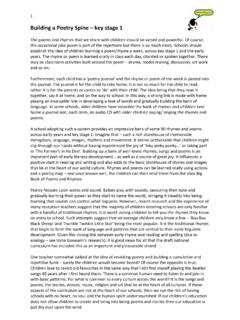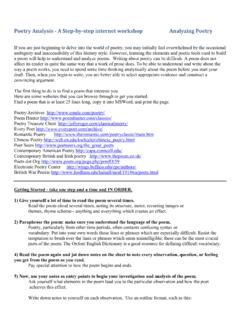Transcription of Gwendolyn Brooks - poems - Poem Hunter
1 Classic poetry Series Gwendolyn Brooks - poems - Publication Date: 2012 - The World's poetry ArchiveGwendolyn Brooks (7 June 1917 3 December 2000) Gwendolyn Elizabeth Brooks was an African-American poet. She was appointedPoet Laureate of Illinois in 1968 and Poet Laureate Consultant in poetry to theLibrary of Congress in 1985. <b>Biography</b> Gwendolyn Elizabeth Brooks was born on June 7, 1917, in Topeka, Kansas, thefirst child of David Anderson Brooks and Keziah Wims. Her mother was a formerschool teacher who had chosen that field because she could not afford to attendmedical school. (Family lore held that her paternal grandfather had escapedslavery to join Union forces during the American Civil War.) When Brooks was sixweeks old, her family moved to Chicago, Illinois during the Great Migration; fromthen on, Chicago was her hometown.
2 She went by the nickname "Gwendie"among her close friends. Her home life was stable and loving, although she encountered racial prejudice inher neighborhood and in schools. She attended Hyde Park High School, theleading white high school in the city, before transferring to the all-black WendellPhillips. Brooks eventually attended an integrated school, Englewood HighSchool. In 1936 she graduated from Wilson Junior College. These four schoolsgave her a perspective on racial dynamics in the city that continued to influenceher work. <b>Career</b> Brooks published her first poem in a children's magazine at the age of the time she was sixteen, she had compiled a portfolio of around 75 publishedpoems. At seventeen, she started submitting her work to "Lights and Shadows",the poetry column of the Chicago Defender, an African-American newspaper.
3 Herpoems, many published while she attended Wilson Junior College, ranged in stylefrom traditional ballads and sonnets to poems using blues rhythms in free characters were often drawn from the poor of the inner city. After failing toobtain a position with the Chicago Defender, Brooks took a series of secretarialjobs. By 1941, Brooks was taking part in poetry workshops. A particularly influentialone was organized by Inez Cunningham Stark, an affluent white woman with astrong literary background. The group dynamic of Stark's workshop, all of whoseparticipants were African American, energized Brooks . Her poetry began to - The World's poetry Archivetaken seriously. In 1943 she received an award for poetry from the MidwesternWriters' Conference.
4 Brooks ' first book of poetry , A Street in Bronzeville (1945), published by Harperand Row, earned instant critical acclaim. She received her first GuggenheimFellowship and was included as one of the Ten Young Women of the Year inMademoiselle magazine. With her second book of poetry , Annie Allen (1950), shebecame the first African American to win the Pulitzer Prize for poetry ; she alsowas awarded poetry magazine s Eunice Tietjens Prize. After President John F. Kennedy invited Brooks to read at a Library of Congresspoetry festival in 1962, she began a second career teaching creative writing. Shetaught at Columbia College Chicago, Northeastern Illinois University, ChicagoState University, Elmhurst College, Columbia University, Clay College of NewYork, and the University of Wisconsin Madison.
5 In 1967 she attended a writers conference at Fisk University where, she said, she rediscovered her rediscovery is reflected in her work In The Mecca (1968), a long poem abouta mother searching for her lost child in a Chicago apartment building. In TheMecca was nominated for the National Book Award for poetry . On May 1, 1996 Brooks returned to her birthplace of Topeka, Kansas. She wasinvited as the keynote speaker for the Third Annual Kaw Valley Girl ScoutCouncil's "Women of Distinction Banquet and String of Pearls Auction." Aceremony was held in her honor at a local park at 37th and Topeka Boulevard. <b>Personal</b> In 1939 Brooks married Henry Lowington Blakely, Jr. They had two children:Henry Lowington Blakely III, born October 10, 1940; and Nora Blakely, born in1951.
6 From mid-1961 to late-1964, Henry III served in the Marine Corps, first atMarine Corps Recruit Depot San Diego and then at Marine Corps Air StationKaneohe Bay. During this time, Brooks mentored his fiancee, Kathleen Hardiman,today known as anthropologist Kathleen Rand Reed, in writing poetry . Upon hisreturn, Blakely and Hardiman married in 1965. Brooks had so enjoyed thementoring relationship that she began to engage more frequently in that rolewith the new generation of young black poets. <b>Legacy and Honors</b> 1968, appointed Poet Laureate of - The World's poetry Archive1985, selected as the Consultant in poetry to the Library of Congress, anhonorary one-year position whose title changed the next year to Poet , inducted into the National Women's Hall of , chosen as the National Endowment for the Humanities' Jefferson Lecturer,one of the highest honors in American literature and the highest award in thehumanities given by the federal , presented with the National Medal of , honored as the first Woman of the Year chosen by the Harvard Black Men' awards she received included the Frost Medal, the Shelley Memorial Award,and an award from the American Academy of Arts and Letters.
7 Brooks alsoreceived more than seventy-five honorary degrees from colleges and died at age 83 on December 3, 2000, at her Southside Chicago is buried at Lincoln Cemetery in Blue Island, - The World's poetry ArchiveA Bronzeville Mother Loiters In Mississippi. Meanwhile,A Mississippi Mother Burns Bacon From the first it had been like aBallad. It had the beat inevitable. It had the wildness cut up, and tied in little bunches,Like the four-line stanzas of the ballads she had never quiteunderstood--the ballads they had set her to, in school. Herself: the milk-white maid, the "maid mild"Of the ballad. PursuedBy the Dark Villain. Rescued by the Fine was worth was good to be a "maid mild."That made the breath go fast. Her bacon burned.
8 SheHastened to hide it in the step-on can, andDrew more strips from the meat case. The eggs and sour-milk biscuitsDid well. She set out a jarOf her new quince preserve.. But there was something about the matter of the Dark should have been older, hacking down of a villain was more fun to think aboutWhen his menace possessed undisputed breath, undisputed height,And best of all, when history was clutteredWith the bones of many eaten knights and princesses. The fun was disturbed, then all but nullifiedWhen the Dark Villain was a blackish childOf Fourteen, with eyes still too young to be dirty,And a mouth too young to have lost every reminderOf its infant softness. - The World's poetry Archive That boy must have been surprised! ForThese were grown-ups.
9 Grown-ups were supposed to be the Fine Prince--and that other--so tall, so broad, soGrown! Perhaps the boy had never guessedThat the trouble with grown-ups was that under the magnificent shell ofadulthood, just under,Waited the baby full of occurred to her that there may have been somethingRidiculous to the picture of the Fine PrinceRushing (rich with the breadth and height andMature solidness whose lack, in the Dark Villain, was impressing her,Confronting her more and more as this first day after the trialAnd acquittal (wore on) rushingWith his heavy companion to hack down (unhorsed)That little foe. So much had happened, she could not remember now what thatfoe had doneAgainst her, or if anything had been breaks were everywhere. That she could thinkOf no thread capable of the necessarySew-work.)
10 She made the babies sit in their places at the , before calling HIM, she hurriedTo the mirror with her comb and lipstick. It was necessaryTo be more beautiful than beautiful sometimes she fancied he looked at her as thoughMeasuring her. As if he considered, Had she been worth it?Had she been worth the blood, the cramped cries, the little stirring bravado, Thegradual dulling of those Negro eyes,The sudden, overwhelming little-boyness in that barn?Whatever she might feel or half-feel, the lipstick necessity was something must never concludeThat she had not been worth it. HE sat down, the Fine Prince, andBegan buttering a biscuit. HE looked at HIS papers were in from the North, HE mumbled. More maddening their pepper-words, "bestiality," and "barbarism," - The World's poetry Archive"Shocking.















